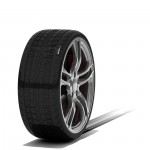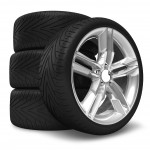Winter driving conditions are more difficult for tires with less traction. The snow and ice on the roads cause regular and all season tires to lose their grip and traction. Cold temperatures also have a negative effect on the material in regular and all season tires. The material does not remain flexible enough, causing the tires to lose additional traction. Without proper tire traction, the vehicle is more likely to slip and cause an accident. The unique design and composition of snow tires offer better traction in the winter.
Tire dealerships and complete auto service stores sell snow tires. Some of these sellers, such as Grand Premier, offer complete tire care. When purchasing and installing a new set of tires, wheel alignment and balancing extends the life of the tires. During a proper alignment and balance, an auto service technician makes sure to fit the wheels properly on the vehicle. Wheel balancing prevents the tires from carrying too much of the vehicle’s load on one side of the tread.
All types of tires come in different sizes and a trained technician will be able to find a match according to the car manufacturer’s specifications. The maximum life of the tire will vary according to size and make. Tires with an expected life between 50,000 and 60,000 miles are standard for passenger vehicles. Custom tires and fits are available at tire specialty service shops.
Drivers who face more hazardous roads in the winter may want to consider tire sniping. This service installs additional treading on each tire. Sniping gives the tire extra traction and flexibility on wet, cold and icy roads. The material in winter tires already has increased flexibility in colder temperatures, but sniping enhances this flexibility even further. Winter tire material is adept at propelling water from the surface of each wheel to improve traction ability.
Not all drivers choose to purchase winter tires when the driving conditions become more dangerous. Those who consistently drive longer distances in the winter, in mountainous terrain or in areas with harsher winters are more likely to invest. Winter tires provide an additional safety buffer and can prevent accidents from unnecessary sliding.




